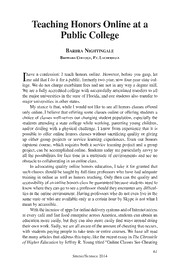
ERIC EJ1081642: Teaching Honors Online at a Public College PDF
Preview ERIC EJ1081642: Teaching Honors Online at a Public College
Teaching Honors online at a Public College barbra nigHtingale broWard college, ft. lauderdale I have a confession: I teach honors online. However, before you gasp, let me add that I do it for a public, formerly two-year, now four-year state col- lege. We do not charge exorbitant fees and are not in any way a degree mill. We are a fully accredited college with successfully articulated transfers to all the major universities in the state of Florida, and our students also transfer to major universities in other states. My stance is that, while I would not like to see all honors classes offered only online, I believe that offering some classes online or offering students a choice of classes well-serves our changing student population, especially the students attending a state college while working, parenting young children, and/or dealing with a physical challenge. I know from experience that it is possible to offer online honors classes without sacrificing quality or giving up either group projects or service learning experiences. Even our honors capstone course, which requires both a service learning project and a group project, can be accomplished online. Students today are particularly savvy to all the possibilities for face time in a multitude of environments and see no obstacle to collaborating in an online class. In advocating quality online honors education, I take it for granted that such classes should be taught by full-time professors who have had adequate training in online as well as honors teaching. Only then can the quality and accessibility of an online honors class be guaranteed because students need to know where they can go to see a professor should they encounter any difficul- ties in the online environment. Having professors who do not even live in the same state or who are available only at a certain hour by Skype is not what I mean by accessible. With the increase of apps for online delivery systems and of Internet access at every café and fast food enterprise across America, students can obtain an education more easily, but they can also more easily find ways around doing their own work. Sadly, we are all aware of the amount of cheating that occurs, with students paying people to take tests or entire courses. We have all read the many articles that address this topic, like the recent essay in The Chronicle of Higher Education by Jeffrey R. Young titled “Online Classes See Cheating 61 spring/summer 2014 teaChing honors online at a publiC College Go High-Tech.” However, other studies explore how to limit cheating or show that the amount of online cheating does not exceed cheating in traditional classes and may, in fact, be less frequent (Watson and Sottile). Knowing students personally surely helps to reduce cheating, and having a full-time faculty member teaching online classes helps to ensure that the stu- dents are known to the college and to the professor. All honors students should have personal contact with peers and professors on their college campus. Offering many opportunities throughout the semester for live interaction, for instance, is likely to decrease the likelihood of cheating. Getting to know stu- dents, engaging them in discussion, and encouraging them to participate in conferences is essential to a quality honors program. With these opportunities and precautions in place, an honors program at a public college can achieve important benefits for students as well as for the program by offering online courses. RefeReNCes Watson, George and James Sottile. “Cheating in the Digital Age: Do Students Cheat More in Online Courses?” Online Journal of Distance Learning Administration XIII.1 (spring 2010). <http://www.westga.edu/~distance/ ojdla/spring131/watson131.html>. Young, Jeffrey R. “Online Classes See Cheating Go High-Tech.” The Chron- icle of Higher Education 4 February 2014. <http://chronicle.com/article/ Cheating-Goes-High-Tech/132093>. ******* The author may be contacted at [email protected]. 62 Journal of the national Collegiate honors CounCil
